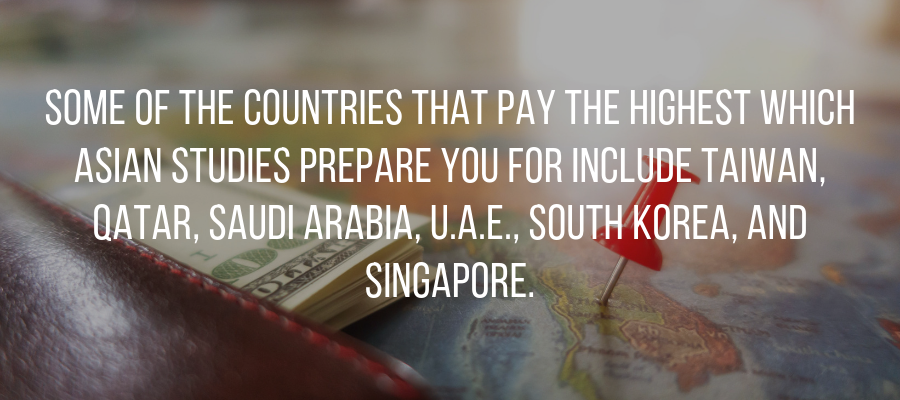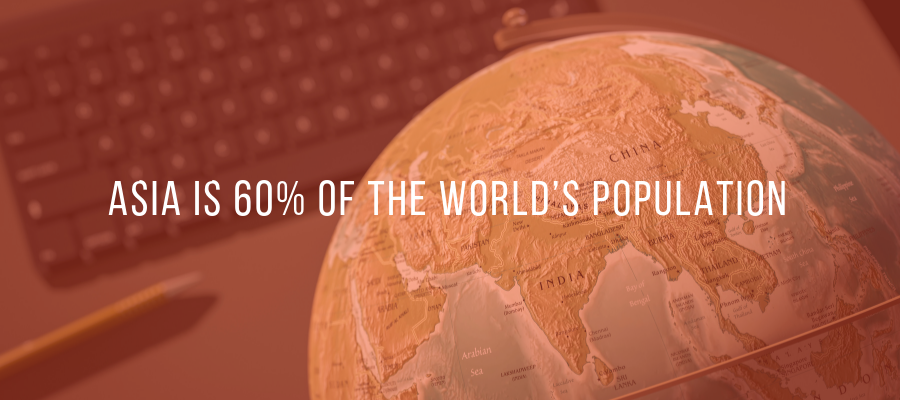![]()
The right to a quality education is, I believe, the perfect path to bridge the gap between different cultures and to reconcile various civilizations. Without such a right, the values of liberty, justice, and equality will have no meaning. Ignorance is by far the biggest danger and threat to humankind – Moza bint Nasser
East & South Asian studies are complex, interdisciplinary programs that touch on politics, philosophy, culture, language, business, economics, art, and every other aspect of countries in the respective regions.
Students will likely be expected to become proficient in at least one foreign language in these programs, and can go from exploring different aspects of different countries down to finding a specific niche within a country or region to study and work in.
If you’ve always had an affinity for Asian cultures or countries, this might be an excellent way to parlay your interests into a career.
Imagine you’re a business student looking to break into a specific career path after graduating. Depending on your skillset you’ll likely find yourself competing for American jobs, against other Americans. However, as an Asian studies major, you’ll develop skills that let you work in foreign countries, in the West, or as a conduit between the two. There’s a significant demand for Americans with foreign language skills throughout the world, and especially in south and east Asian countries. You’ll be able to supplement that demand with cultural understanding to match your language skills after graduating from an Asian studies program.

Do you love to travel? Many Asian studies programs require foreign travel, field research, and much more that will carry you throughout the world.
In this guide we’ll look at the available degree options in east and south Asian studies, how to choose between them, and what we’ve done to help you find the right degree for you. We’ll also explore specializations and focuses, potential earnings, and throughout try to assist you in determining whether these degrees are for you.
Before we begin, let’s look at some questions you should use throughout your search for an Asian studies degree, or any other degree you might consider:
- What are your career goals, and how will an Asian studies degree prepare you to meet and exceed them?
- What degrees have you earned in higher education thus far? What role do you want both short term and long term? You might need advanced degrees to reach certain roles, or be able to work your way up from a Bachelor’s.
- You don’t need to know your precise path. But you should have an idea of what area you want to go into (diplomacy, foreign business, academia, criticism, writing, research, etc.)
- How much can you pay in tuition and other related costs? How much would you need to borrow to afford a particular program? Different Asian studies degrees have different costs associated with them. These rely on the delivery format you choose, scholarships you qualify for, the school itself, and much more.
- Whenever you can choose degrees from schools you can afford. If that’s not feasible, choose public loans over private ones.
- Only choose from schools that are affordable, accredited, and non-profit. Steer clear of for-profit, badly accredited, and overly expensive schools.
- Are you employed? Can you work and go to school at the same time? How much time can you commit to your degree daily, each week, and in total before graduation?
- What delivery format is ideal for you? Do you want to attend school part-time, full-time, online, on-campus, or in a mix of online and traditional study?
- Depending on where you go to school, and what Asian countries you specialize in, you’ll have different opportunities in terms of where you live, study, and eventually work.
- What is your educational and career experience? Where have you thrived? Where do you need improvement? How does an Asian studies program build on your strengths and shrink your weaknesses?
- What are the specializations and focuses available in Asian studies degree programs? How can a focus or specialization help you do what you want to before and after graduating?

This is just some of what you should be asking yourself and considering when searching for an Asian studies program. It’ll help out a lot if you write out these and other considerations that are important or specific to your wants and needs.
Now let’s look at some of what you’ll gain and cultivate in these programs:
East & South Asian Studies Degrees Require and Build Up Your:
- Versatility: These programs involve interdisciplinary study in so many different areas. Through all this disparate study you’ll build a wide range of hard and soft skills that you can apply to your career and life.
- Language Skills: You’re not going to go very far in East & South Asian studies without becoming at least somewhat proficient in one or more foreign languages. Speaking foreign languages doesn’t just lead to job opportunities, but also will transform the life experiences you’ll be able to enjoy throughout your travels.
- Cultural Understanding and Empathy: Asian countries are in many ways diametrically opposed to life in the West. By studying these countries, their history, arts, politics, languages, and culture, you’ll enrich your understanding of the human condition, and become closer to people you might have had trouble identifying with previously.

- Curiosity: You need to be fascinated by the unfamiliar to thrive in these programs. If that sounds like you, great!
- Critical Thinking: Studying foreign cultures requires you to solve new problems about things you’re unfamiliar with constantly. You’ll need to do tremendous research, build upon new concepts, and separate yourself from your perspectives and biases. This will be beneficial in every aspect of your life.
- Street Smarts: It’s one thing to know how to get around and be successful in your hometown. It’s much different to do it in a foreign country that has a significantly different culture and rules that govern its society. By spending time studying foreign countries and visiting them, you’ll build out your confidence and ability to succeed throughout your career and travels.
- Desirability: You’ll likely be highly demanded by many industries, and in many different parts of the world after graduating from one of these programs. Not many Americans get the training and skills you’ll receive in these programs, which will separate you from your competition throughout your career.
Use these examples as a way to determine whether you fit well into an Asian studies program. These programs will do much more for you, but to ultimately be successful you’ll need significant passion and drive for what you’ll study.
Now let’s look at what we’ve done to help you in your search:
How Can We Help You Find the Right East & South Asian Studies Degree for You?
Here at Degree Query we’ve produced many different forms of content and resources that can help you get the best degree for you. We’ve ranked degrees, and written about trends in education. We’ve also provided you tools like our compare careers matrix which helps you decide the best degree for you, and answered common questions about a host of different topics. Some of the work we’ve done that specifically targets East & South Asian Studies, and the fields that interact with them includes the following links.

A lot of these degrees and programs in more traditional programs could potentially be combined with foreign or Asian studies depending on the offerings of different schools.
Rankings
Top 25 Fastest Online Doctorate Degrees- Top 50 Degrees for the Future
- Top 50 Degrees For Changing The World
- Top 15 Liberal Arts Schools in America
- 50 Highest Paying Bachelor’s Degrees
- Top 50 Free International Universities for U.S. Students
Frequently Asked Questions
- What Can I Do With a Law Degree?
- What Is the Fastest School for a Master of Finance Degree?
- What Can I Do With a Sociology Degree?
- What Can I Do With a Marketing Degree?
- What Can I Do With An Anthropology Degree?
- What Can I Do With a History Degree?
- What Degree do I need to be a Curator?
- Where Are the Best Places to Study Abroad While Earning a Bachelor’s Degree?
Now let’s look at the available levels of degrees in this field:
What are the Different Levels of East & South Asian Studies?
Associates in East & South Asian Studies
At the Associate level you’re much more likely to find general history programs that may or may not include east and south Asian studies. You can look at the syllabi of any programs you’re interested in or ask the support staff at the schools that offer them directly to determine whether the program will touch on topics and regions you’re interested in pursuing an education in. These programs are generally two years long, and can often be taken online, or at junior or community colleges. These options let you save time and money while earning credits that can be applied towards an undergraduate degree in the field. As a graduate of one of these programs, you’ll most likely want to continue your education at the next level:
Bachelors in East & South Asian Studies
In these programs you’ll use an interdisciplinary approach to mine various areas of Asian studies. You’ll likely need four years to complete these programs, unless you select an accelerated program or come into them with applicable credits, either from advanced placement tests in high school or an Associate’s degree. You’ll study topics like American and Asian relations, the Vietnam War, modern Chinese culture, Buddhism and its philosophies, Indian, Chinese, and Japanese art and media, Asian economics and politics, and much more. You’ll likely study an Asian language, and can expect to graduate with an intermediate grasp of whichever language you select. Graduates will be prepared to work as translators or interpreters, correspondents in foreign countries, consultants in foreign countries (or Asian expert consultants in the West), financial advisors for Asian markets, and international marketing specialists. They can also go on to a graduate education in Asian studies.

Masters in East & South Asian Studies
These programs often require students to prove their sufficiency in an Asian language as a condition of their acceptance. You’ll also likely focus on a specific part of the continent, as opposed to a more general look at it in undergraduate programs. You’ll look at economics, politics, arts, natural resources, geography, linguistics, and much more as part of these programs. Students will take classes from political science, history, and anthropology departments, among others depending on their focuses or specializations in the field (more on that coming up soon). These programs will likely take you two years to complete and may include a thesis or other culminating project showcasing what you’ve learned throughout your studies. Graduates will be prepared to work in advanced positions as interpreters, marketers, financial experts, in academia, research, and much more. They can also go on to earn their doctorate:
Doctorates in East & South Asian Studies
Here you’ll focus even further on one subject, area, or a country within this broad and diverse continent. You’ll gain advanced language skills in whatever language you’ve studied previously, and may reach an intermediate level in a second Asian language that’s newer to you. You’ll need three to five years to complete these programs, and will write an original dissertation, defend it. You’ll also probably do significant academic field research on your thesis in a foreign country. You can study areas like Asian international politics, South or East Asian health care and its politics, or gain a profound understanding of a country like Pakistan, North Korea, Bangladesh, China, etc. Graduates will be prepared to work at the highest levels of academia, international business, international law, government, diplomacy, and more.
Now let’s inspect some of the specializations and focuses in East & South Asian studies programs:
What are the Different Specializations and Focuses in East & South Asian Studies Degrees?
East & South Asian Economics
Here you’ll explore how economics in specific countries and the continent itself developed, and how it relates to American economics and foreign policy. You’ll examine policies, competition, development of regions and countries, international trade, governance, and much more. You’ll more likely end up working in a theoretical area post-graduation, but can also do practical work depending on your drive and experience.

East & South Asian Politics
Asian politics go back centuries but have also seen significant changes in the last few decades. You might look at China’s emergence as a world power, India’s growing economy, military, and political upheaval, and climate change catastrophes in Bangladesh and throughout the region, among other topics. There’s so much to explore in these programs, and so much vital work to be done both locally and on the international stage. People that can bridge the gap between the East and West will always be highly demanded in the world of politics.
East & South Asian History
In these programs you’ll focus on everything that’s come before in a specific country, region, or the continent itself. You’ll likely be prepared to work as a writer, historian, researcher, or professor with a specialty in a specific area of Asian history (either country or period).
East & South Asian Comparative Literature
Here you’ll look at the literature of different east and south Asian countries to explore cultural, political, and philosophical similarities and differences between them. You’ll likely work in criticism or academia once you graduate.
East & South Asian Film and Theater Studies
The film and theater tradition in south and east Asian countries often goes overlooked in the West, but it’s a diverse and fascinating world you can explore in these specializations. You’ll look at its history, current works, and find a role within it either in a practical or academic position after graduating.
East & South Asian Business
The Asian markets are some of the most versatile and lucrative on earth. They are rapidly expanding in part because of their large pool of cheap labor and relatively lax regulations and workers’ rights. By becoming well versed in the problems, opportunities, and cultural practices in these countries you can become invaluable as a conduit between the East and West, or within Asia itself.

Before we finish let’s look at some of what you can expect to get out of South and East Asian studies programs financially:
East & South Asian Studies Degrees in Conclusion
With any luck you’ve found this guide interesting, fun, and helpful in your search for a degree, whether it’s in Asian studies or otherwise. We’re continually expanding our content, and have covered many different disciplines throughout higher education that you can explore through our Degree Programs tab at the top of the homepage.
So what could you potentially earn after graduating from a program in Asian studies?
There are many different roles in this field, but some of them include the following. For all of these we’ve looked at the United States Bureau of Labor Statistics to find the latest information about the current state of these roles, and what they’re predicted to do in the future.
- There are many business occupations that Asian studies programs can prepare you for. Here’s a list of them that you can use to cross-examine programs you’re considering to see if you’ll be qualified for them after graduating.
- Keep in mind that adding international skills to your education and experience will likely make you more desirable and offer higher potential earnings than people with a less diverse skill set.
- Political Scientists made a 2018 median pay of $117,570. In 2016 there were 7,300 of these roles *in America*, which was expected to grow by 3% between 2016-26, translating to 200 new jobs.
- Because you’ll likely have opportunities to work in the West or Asia, keep in mind that there will likely be more opportunities for you than for graduates of comparable, Western-centered programs.
- Historians made a 2018 median pay of $61,140 per year and generally needed a Master’s degree to do so. There were 3,300 of these positions in 2016, which was predicted to grow by 6% between 2016-26, leading to 200 new jobs.
- Interpreters and translators earned a 2018 median pay of $49,930 annually. There were 68,200 of these jobs in 2016. These roles were predicted to increase by 18% between 2016-26, with 12,100 new jobs created.

This is just a drop in the bucket of the positions you could qualify for after graduating from a program in East & South Asian studies. It all depends on what you want, what program you pick, and the focuses, courses, professors, and opportunities it can offer you. Of course, your hard work will be the gasoline powering this engine. Being here is an excellent start towards demonstrating your commitment to pursuing and thriving in one of these programs.
Keep in mind that if you find a program or school through our content that you want to explore further, you’ll do yourself a big favor by reaching out to its support staff directly. University websites make it very easy to find people to reach out to who will answer or discuss any questions or considerations you have. They can also be very valuable to help in your application process or to receive any assistance you might qualify for from the school financially or otherwise.
Best of luck in your search and all that you do!
